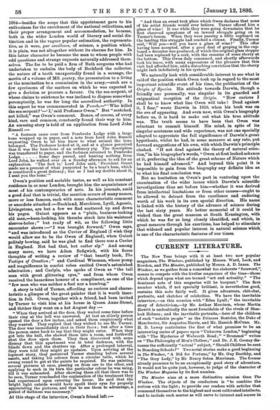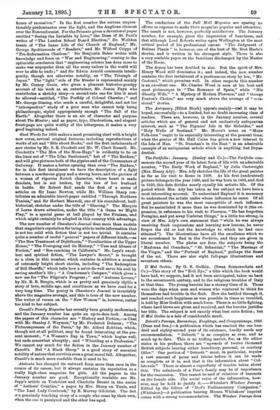The Minster aims at a more distinctive mission than The
Windsor. The objects of its conductors is "to combine the serious with the light ; to provide our readers with articles that commend themselves to the highest and most cultivated intellects, and to include such matter as will serve to interest and amuse in
hours of recreation." In the first number the serious unques- tionably predominates over the light, and the Anglican element over the Nonconformist. For the Primate gives a devotional paper entitled " Seeing the Invisible by Love," the Dean of St. Paul's writes of "The London School Board Election," Dr. Welldon treats of "The Inner Life of the Church of England," Mr.
George Spottiswoode of "Readers," and Mr. Wilfred Cripps of "Pre-Reformation Chalices." Sir Benjamin Baker writes with knowledge and force on "War and Engineering," coming to the optimistic conclusion that "engineering science has done more to make war unpopular than all the army tailors in the world will ever be able to undo ; " and Sir Edwin Arnold comments intelli-
gently, though not otherwise notably, on "The Triumph of Japan." The "light" side of The Minster is represented mainly
by Mr. Corney Grain, who gives a pleasant historico-gossipy account of his work as an entertainer, Mr. James Payn who contributes a sketchy story—a second-rate one for him it must be allowed—entitled, "The Perfidy of Colonel Chawler ; " and Mr. George Gissing, who sends a careful, delightful, and not too "introspective" study of a poor man who cannot help being
philanthropic, styled appropriately enough "The Salt of the Earth." Altogether there is an air of character and purpose about The Minster; and as paper, type, illustrations, and elegant front-page are quite worthy of the letterpress, it makes a very good beginning indeed.



































 Previous page
Previous page